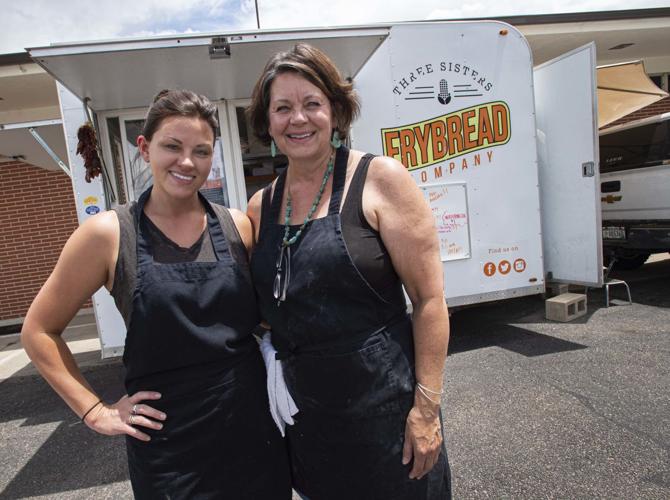There were lots of other things for a kid to do on the huge cattle ranch near Trinidad.
But during her summer-long visits to the 2,500-acre ranch run by her grandparents, Lindy Orist spent her time in the kitchen. That’s where she learned to cook and learned she loved to cook, standing so close to her grandmother that she could touch the tails of her apron.
When Orist decided to start a food truck several years ago, her mind went back to that kitchen, where she’d peel potatoes while her grandmother boiled beans and listened to Paul Harvey on the radio.
Her mind went to the Native American cooking she grew up with.
“This is what I know, so this is what i’m going to do,” Orist thought.
Specifically, she knew fry bread.
Her grandmother taught Orist, who lives in Colorado Springs, how to make the fried flat dough bread. But she never talked about the bread’s unpleasant origin story.
Orist heard those stories later, while attending pow wows with her mom around the Pikes Peak region.
According to Navajo tradition, fry bread was created in the 1860s as a result of the U.S. government moving the Navajo people off their land in Arizona and onto reservations in New Mexico. There, the Navajo could no longer easily grow traditional foods, so they were supplied with ingredients like flour, sugar, salt and lard.
Those ingredients were foreign to them. But they experimented and invented fry bread.
“It’s not traditional in that way,” Orist explains. “But it’s traditional in a sense that it’s been around a while.”
Today, fry bread carries that complicated history. Some Native American chefs are resistant to keeping it on menus.
“There’s this dichotomy between the hardship and the sadness that comes with the origin of fry bread,” Orist said.
The other side?
“It’s what they know,” Orist said. “It’s something that has transitioned from what they had to eat to something they want to eat.”
Orist has opted to celebrate fry bread, which she describes as a staple of her family meals.
She and her daughter, Sara Morris, opened Three Sisters Frybread five years ago. The menu includes a variety of Native American tacos made with, yes, fry bread.
“We started it as a hobby,” Orist said.
Up until this year, they’d only open up the food truck “here and there” in the summertime. When restaurants shut down due to COVID-19, they saw an uptick in business.
“Now we’ve been busier than ever,” Orist said. “We’ve been invited out to neighborhoods. And the whole neighborhood comes out.”
The mother and daughter prepare 50 pounds of dough, which makes 300 pieces of fry bread. They sell out every time.
Orist fries each piece to order, so customers can see the process she learned from her grandmother and that she taught her daughter.
“They’re my little babies, my little piles of dough,” Orist said. “I like to know they’re cooked perfectly.”
Since she’s been so busy, Orist is thinking about the next phase of their food truck. She recently bought a 28-foot passenger schoolbus she plans to renovate into a bigger version of Three Sisters.
Orist never wants it to feel too big, though. She likes knowing the names of her regular customers and treating them like one big family.
“They say food is love and it’s really true,” she said. “We put love into what we make, so it feels like we’re feeding our family.”











(0) comments
Welcome to the discussion.
Log In
Keep it Clean. Please avoid obscene, vulgar, lewd, racist or sexually-oriented language.
PLEASE TURN OFF YOUR CAPS LOCK.
Don't Threaten. Threats of harming another person will not be tolerated.
Be Truthful. Don't knowingly lie about anyone or anything.
Be Nice. No racism, sexism or any sort of -ism that is degrading to another person.
Be Proactive. Use the 'Report' link on each comment to let us know of abusive posts.
Share with Us. We'd love to hear eyewitness accounts, the history behind an article.